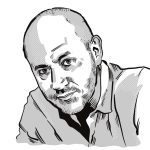
IAN DUNT on his recent battle with Covid.
I tested positive for Covid two weeks ago. The first sign that something was wrong was a hazy feeling of impending flu, which I brushed away. Two days later I was in bed with fever. It was ferocious: your skin either boiling or freezing, no position bearing the least degree of comfort, your brain submerged in a razor-like fog.
After the initial fever faded, Covid delivered a medley of symptoms – a daily lottery of seemingly unrelated ailments. I experienced a permanent throbbing pain in my eyes, which particularly hurt when they moved side to side. Light became unbearable. Even opening the curtains felt like a punishment.
A day later, I developed a ringing in my ears, but it wasn’t uniform. It seemed strongest in the kitchen and then nearly disappeared in the bedroom. Eventually I realised the culprit: an electronic pest repellent which drives away mice by emitting a noise so highly pitched that humans can’t hear it. Except that for some inexplicable Covid-related reason, I now could hear it. The virus was turning me into a rodent.
Most illnesses have a trajectory: you get worse then you get better. Covid is more of a malaise. You get worse, then better, then worse again. It’s a vast indistinguishable wasteland of banality and uncertainty.
I grew terrified of losing my sense of taste and smell. Until I got Covid, it had never really occurred to me how dreadful this would be. But in lockdown, with nothing to differentiate the days, eating and drinking have become one of the few earthly pleasures to which we’re still entitled. The idea of losing that felt like a final step into perpetual mundanity, the last vestiges of colour gone from the world.
It never came. I’m not sure why. There’s some early evidence which suggests that the new variant does not affect taste or smell as often as the original strain did. Either way, I kept mine and was more gratefully for that than I could have imagined.
The worst thing about the experience was the timetable. Most people get fever for the first week and then, between days seven and ten, some will experience problems breathing. This is the coronavirus taking root in the lungs.
At my age, in my state of health, it was unlikely that this would become very serious, but it was not impossible. And when your brain is addled by fever and constant discomfort, you are liable to stress-test that notion of ‘unlikely’ as far as it will go. Any feeling of tightening in the chest or shortness of breath sends a shiver of apprehension through you.
It opened my eyes to something. Over the course of the pandemic, I only really tracked two metrics: the lockdown restrictions and the number of deaths. That’s where our debate is really – we implement the latter in order to prevent a rise in the former.
But being ill revealed a whole new territory of anxiety and despair lying underneath those considerations. I realised how many people were at home with symptoms, feeling that icy dread in their stomach about how serious it’ll turn out to be. I realised how many were labouring under long Covid, months after the initial symptoms had passed. What will they do for work? Where will they find joy in life when they have no energy with which to explore it?
This was the secondary region of the pandemic: the suffering that is less severe than death, but afflicting hundreds of thousands of us, privately and barely remarked upon.
When you’re in that state, the cloying falsities of the Covid-minimisers in the press and parliament feels like a cruel joke.
Some have promoted the idea that we should let the virus flush through the healthy part of the population to develop herd immunity. The idea is ill-judged on its own terms. You cannot protect the vulnerable while infecting the rest of the population. But even if that were not true, it would still be unconscionable.
Covid is not the flu. It is so much worse than that. No-one should have to go through the suffering and uncertainty it entails.
This is the coldest and most brutal winter we’ve ever lived through. That much is certain.
After the fever passed, still unsure which way the disease would go, I stared out the front window of my flat looking for signs of life. I wanted some reassurance that the world continued broadly as usual. But the streets outside, which usually thrum with people, were desolate. London felt like a slab: silent, dead, empty.
In a desperate bid for variation and a little modest exercise, I went out into the back garden and walked around a bit. And there I found something tremendously reassuring. The cherry blossom tree was beginning to bud.
What do you think? Have your say on this and more by emailing letters@theneweuropean.co.uk
Warning: Illegal string offset 'link_id' in /mnt/storage/stage/www/wp-includes/bookmark.php on line 357
Notice: Trying to get property 'link_id' of non-object in /mnt/storage/stage/www/wp-includes/bookmark.php on line 37







